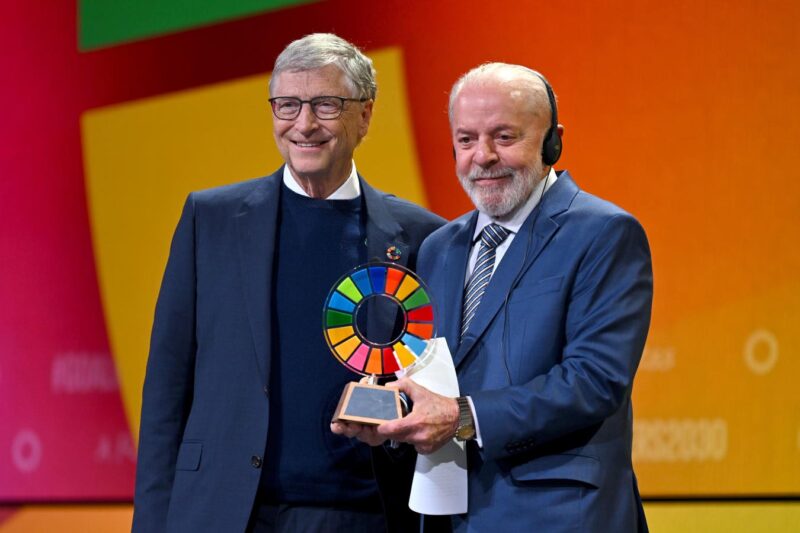Bill Gates and Brazil’s president Luiz Inácio Lula da Silva (host of COP30 meeting next week in Belem) speak on stage during the annual Goalkeepers NYC event in 2024. The event is a catalyst for action linked to the UN’s 17 Sustainable Goals (Photo by Roy Rochlin/Getty Images)
Getty Images
In the pantheon of philanthropy, Bill Gates holds a special status and gravitas because of his cerebral approach to giving, and his willingness to share the analytics behind his investments. Unlike many other tycoons whose gifts come across as idiosyncratic, Gates deserves credit for laying out the rationale for his prioritization. In his most recent write-up for his online platform, Gates argues that world leaders at the upcoming climate summit in Brazil need to prioritize quality of life as the ultimate goal with reference to climate policy. Climate finance, he argues, should prioritize adaptive responses that improve human resilience through better health and access to key amenities to cope in a warming world, rather than just focusing on emission reduction targets.
This message immediately caused unease among climate scientists because of what is deemed by political philosophers as “The Moral Hazard Problem.” The term dates back to nineteenth century insurance policies where agents expressed concerns about consumers engaging in more risky behavior because they felt there was a remedy (insurance) available. The term is now widely applied in environmental policy to describe the moral dangers of presenting technological solutions that may lead to complacence or more harmful consumption or pollution. It is because of the Moral Hazard Problem that of the $1.15 trillion in climate finance flows globally in 2021-22, only around 5% were estimated to have gone for adaptation.
Climate scientists have raised alarm that Bill Gates is perhaps angling for more adaptation finance and too glib about success on emission reductions. Michael Mann from the University of Pennsylvania penned a scathing article in response to Gates for the Bulletin of Atomic Scientists titled “You can’t reboot the planet if you crash it!” Yet Gates has defended his stance despite noting concerns that his message is being misinterpreted by climate skeptics, including President Trump. At a gathering hosted by Caltech, Gates noted that although he no longer believed in the apocalyptic predictions of earlier climate models, he acknowledged massive disruptions. He even warned of potential tipping points which could necessitate the use of drastic measures such as geoengineering with solar radiation management (technologies in which he is also an investor).
What Gates is perhaps not explaining, and which deserves attention is a clear exposition of the new pathways for human evolution that climate change will create. This would preclude the need for drastic and risk interventions such as geoengineering. Whether at the individual level or the collective level, climate change will jolt us into action—for better and for worse. We can react to this convulsive moment with pessimism or optimism, and our actions will define our future at a civilizational level. For too long the conversation around climate change has been divided between mitigation of emissions versus adaptation to maintain the status quo or “cope with change.” This is more akin to “acclimating” or “adjusting.”
There is a third pathway as well, which is to identify key opportunities in the crisis that may arise for specific geographies and capabilities of human endeavor. This is an approach that I have termed “super-adaptation.” Learning from the lessons of past cataclysms, we can forecast what the realities of a warmer world are likely to be and evolve intentionally toward it. For example, Arctic melting will create new terrain that would not have previously existed. Despite many losses to prior ecosystems and species, this terra nova will also create new templates for existence which would not have been possible in a colder world.
To use a more drastic comparison, even a cataclysm like the asteroid strike that led to the extinction of the dinosaurs 66 million years ago, created evolutionary pathways for mammals to evolve. Indeed, as the great evolutionary biologist Stephen Jay Gould argued in his book Wonderful Life, that if you “replayed the tape of life,” outcomes would differ each time. The evolution of Homo sapiens depended on a unique chain of events—mass extinction, climate shifts, continental drift, and chance mutations. There is consensus among paleontologists that without the mass extinction that occurred, reptiles may way well have dominated the planet, and metabolic limitations would prevent them from evolving intelligent beings.
The super-adaptive path is similar to the aphorism – “if life gives you lemons, you make lemonade.” We do not need to be sanguine about the future or to dismiss the need for mitigating emissions or having profligate lifestyles. Instead, we can be “creative conservationists” – holding the fort for our current “Goldilocks zone” while preparing to also harness the opportunities of the climate crisis from a systems perspective if the status quo cannot be maintained. Such an approach is neither “optimism” nor “pessimism”, but a foresight form of opportunistic “pragmatism.” This should be how Bill Gates can extricate himself from the Moral Hazard Problem.









